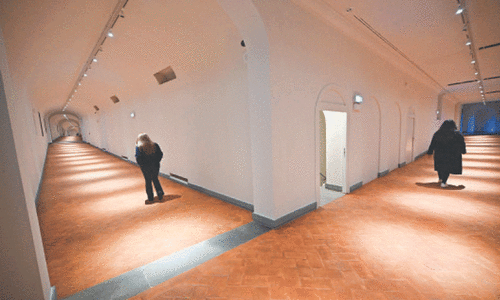CAIRO, Feb 26: Egyptian President Hosni Mubarak has taken the reins of a revolt against US President George Bush's "Greater Middle-East Initiative" for democratic and economic reform in the region, only weeks before the two men are due to meet in Washington.
After a brief visit to Saudi Arabia on Tuesday, Mubarak "forcefully rejected ... already written prescriptions" coming from outside the region, especially from the United States, to remodel the Middle East after the Iraq war, the newspaper Al-Ahram said.
The Egyptian leader, flying back from Riyadh, gave Egyptian journalists a no-holds-barred assessment of the "Initiative" ahead of what has been termed a "strategic dialogue" with Bush in April.
"The president denounced with force the ready-for-use prescriptions proposed abroad under cover of what are called reforms, and attempts to impose them on the region," said Al-Ahram. It added that Mubarak believed "reforms are necessary and inevitable, on condition that they come from within and conform to the needs and convictions of the peoples."
His comments echoed those in a statement issued in Riyadh on Tuesday night after Mubarak had left Riyadh. In that, the two regional heavyweights gave the thumbs down to Bush and "affirmed that Arab states proceed on the path of development, modernisation and reform in keeping with their people's interests and values."
Washington has already reacted to the cold water poured on the Bush plan by Cairo and Riyadh. On Wednesday, US Secretary of State Colin Powell told a US-funded Arabic television channel broadcasting in the Middle East: "I agree with the Egyptians and the Saudis: (reform) can't be imposed from outside. It has to be accepted from the inside."
"We would never suggest a reform plan that should come from outside," he said. On Thursday, Egypt's three government daily newspapers, Al-Ahram, Al-Akhbar and Al-Gumhuriya, reported the president's reaction to the Bush initiative in banner headlines on their main news page.
Reports last week in the Arab press suggested that Egypt and Saudi Arabia were the main targets of the Greater Middle-East Initiative for the political re-drawing of the region, in a blueprint extending from Pakistan to Mauritania, via Iran, Iraq, Syria, Lebanon and Arab North Africa.
At least two analysts writing in Egyptian papers said the plan, which is also intended to involve the European Union and the North Atlantic Treaty Organisation, could obscure the Israeli-Palestinian conflict.
Mohammed Sid-Ahmed said in Al-Ahmra that the US project would mean "the Palestinian cause would lose its specific character and central position" and leave the "region prisoner to interminable violence".
The United States hopes to launch its Middle East initiative in June during the Group of Eight (G8) industrialised countries' summit in the southern US state of Georgia.
Mubarak usually visits the United States each year, and the April trip was meant to open a "strategic dialogue" on his country's role in the Middle East. However, the date of the visit has not been confirmed officially, and last year Mubarak did not go because of the war in Iraq.
A White House spokesman said Bush and Mubarak Wednesday had discussed the Middle East by telephone and "both leaders stated that they look forward to seeing each other soon." -AFP














































Dear visitor, the comments section is undergoing an overhaul and will return soon.